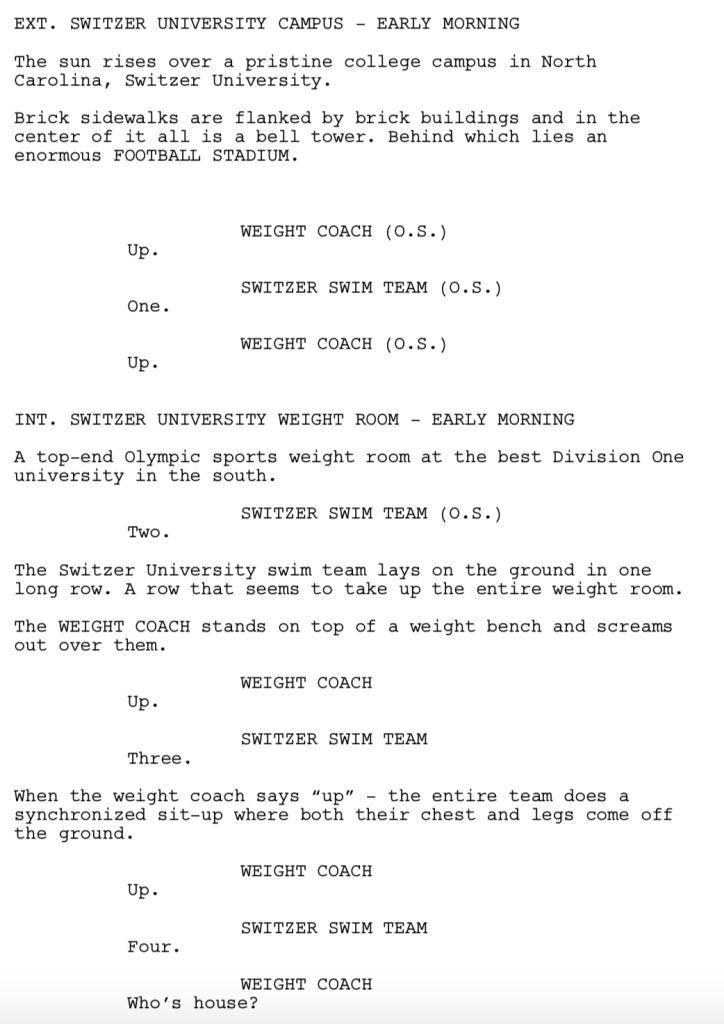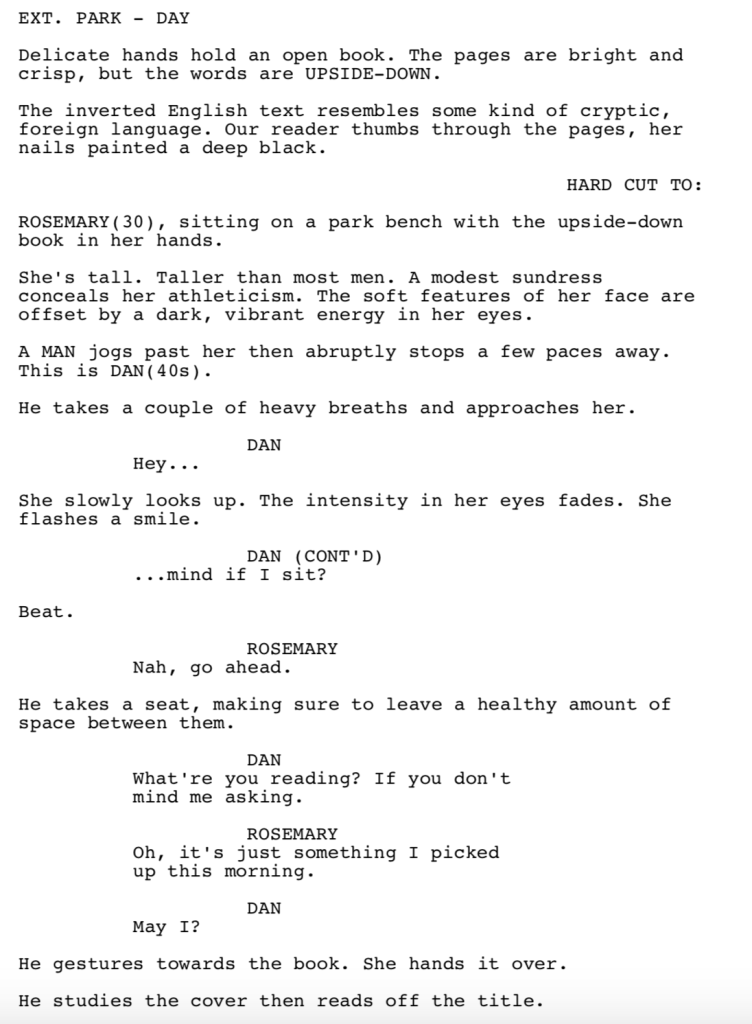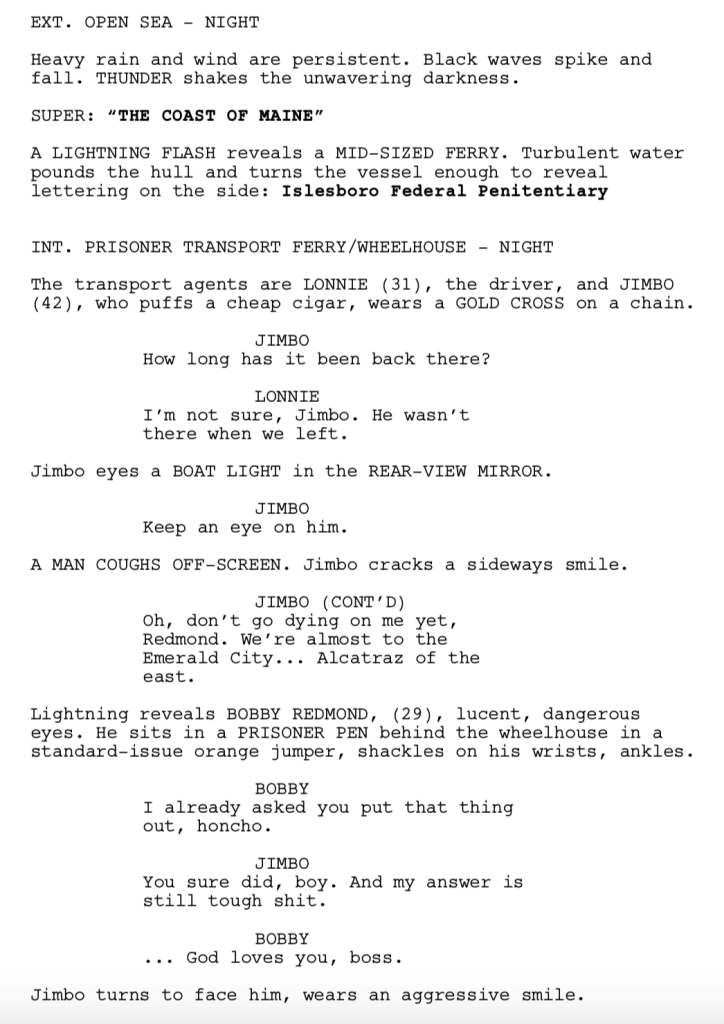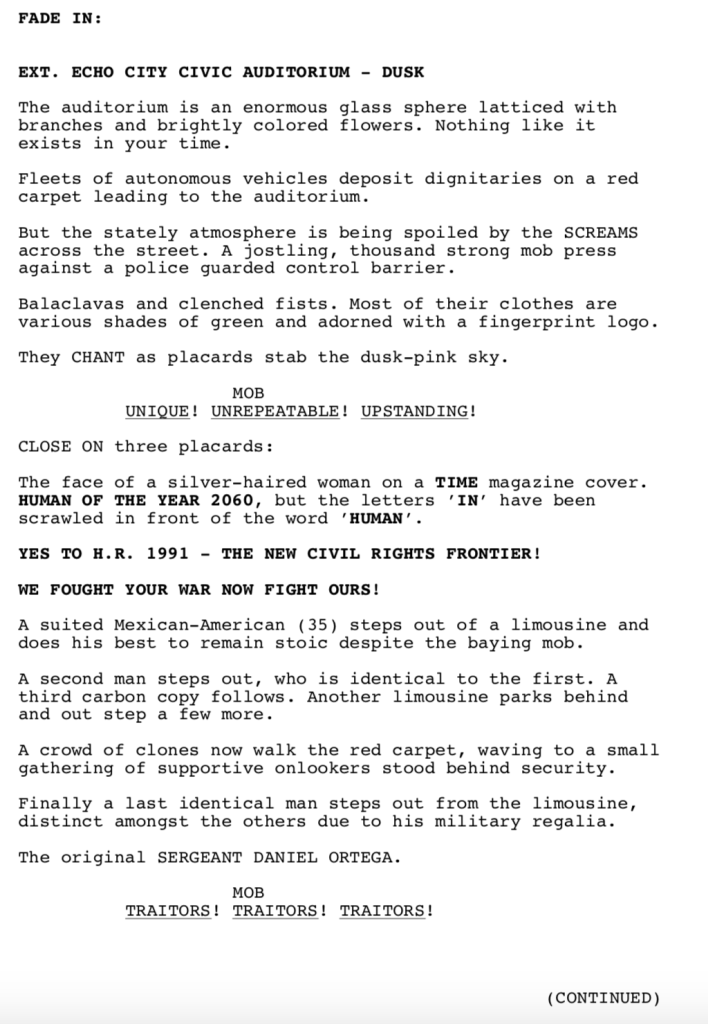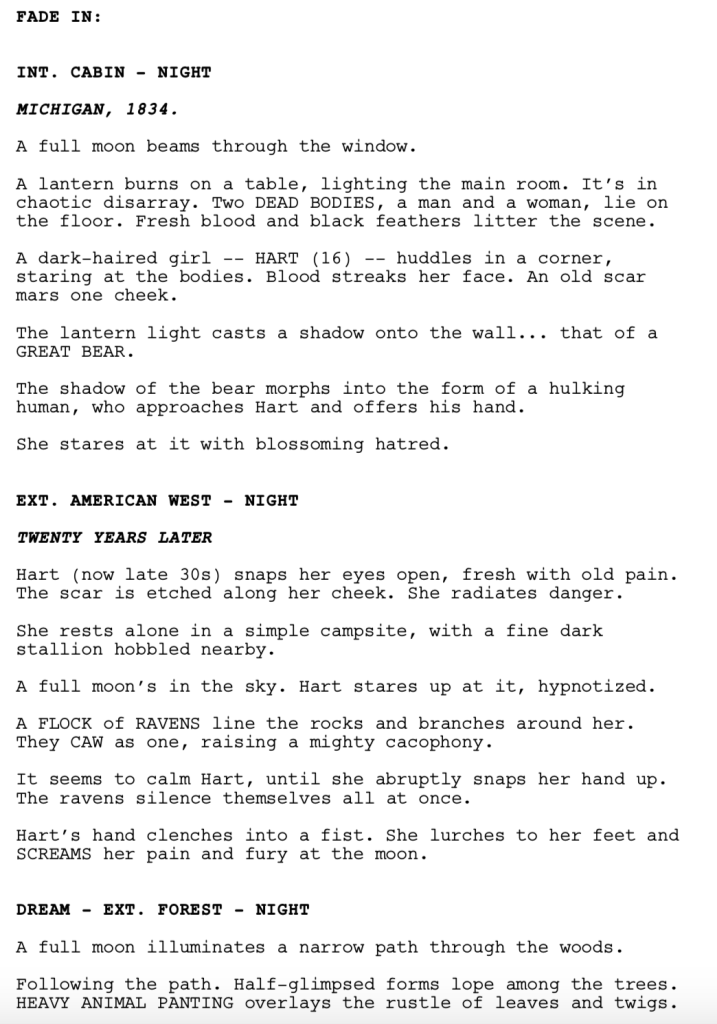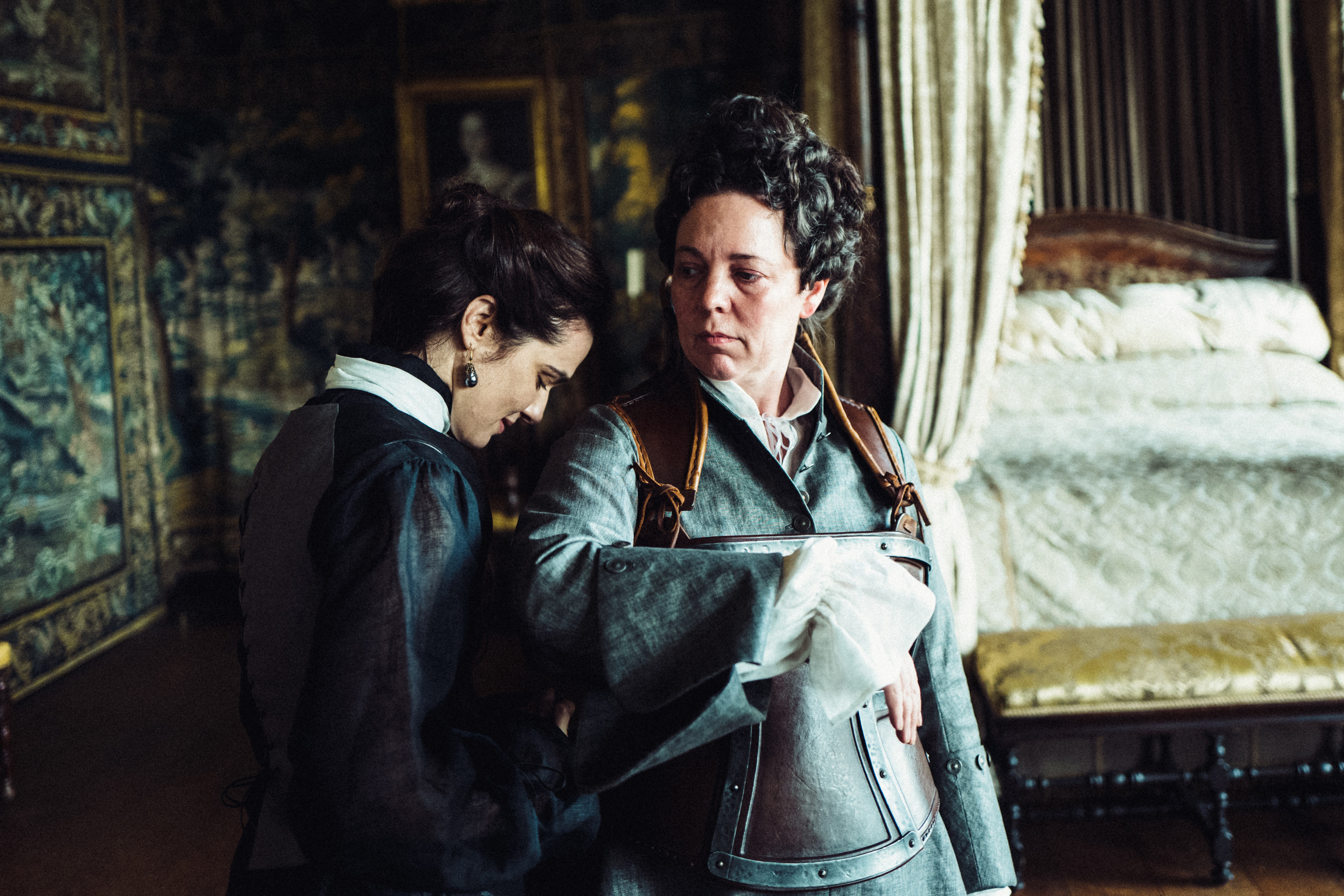Genre: Article/True Story
Premise: After having a stroke, a prominent Los Angeles doctor begins rapping, eventually taking his talents to the heart of the Los Angeles street rap scene.
About: This Atlantic article was discovered and picked up by producer Michael Sugar (Spotlight). Sugar will produce the film for Netflix. John Hamburg (I Love You, Man and Why Him), will adapt and direct the film. Jeff Maysh, who likes to write articles that have the potential to become movies, wrote the article. Here’s another of his articles about a unique catfishing story. And another about a wedding used as a drug dealer sting. Neither have been optioned yet. Maybe someone here will change that.
Writer: Jeff Maysh
Details: Article appeared in The Atlantic on January 16th.
We’re doing something different today. As I’ve talked about freely over the last year, spec sales are down, which means you have to be more strategic in the way you approach breaking in. If you’re not writing a contained horror, contained thriller, or guy/girl with a gun spec, you need to be open to new avenues besides the straight spec script.
One of those avenues is to write articles or short stories and post them on the internet, or look for popular articles and stories and try to get the rights to them. This brings up a larger question about what makes a good movie idea. When you read a short story, news article, or Twitter rant, how do you know if it has the weight to be adapted into a feature film? I have the answer for you. But before I go there, let me break down this article.
Dr. Sherman Hershfield was a neurologist in the 1980s and 90s. Then, during the 90s, he started having blackouts. Later, those blackouts would turn into a stroke. And when Hershfield came out of the stroke, something was different. Without trying, everything he said came out in rhyme. Unable to practice medicine anymore, Hershfeld began obsessing over poetry, and, eventually, rap.
One day, when someone heard him rapping on a bus, they told him he should check out Leinhart Park. They had an open mic for rappers there. Anybody could get up and spit rhymes. The only catch was that Hershfield was a 50-something Jewish man. And Leinhart Park was the area where Rodney King got beaten up. To say the area was skeptical of rich white men would be an understatement.
Hershfield went anyway. But when he got onstage, he was far from an immediate sensation. He was more a poet than a rapper. The only reason he didn’t get kicked off that first night was because the crowd felt sorry for him. But Hershfield wasn’t fazed. He began studying the history of rap and practiced every day. Even as his Beverly Hills family became embarrassed of him, he didn’t stop.
One day after performing, Hershfield met rap legend and now mentor KRS-One. KRS-One saw a passion, but more importantly, a unique point of view, in Hershfield. He was bringing a different kind of battle to his music. KRS-One schooled Hershfield on the technicalities of rap, and now when Hershfield went to Leinhart, crowds were looking forward to his performances. He would eventually adopt the moniker, “Dr. Rapp.” Unfortunately, Hershfield’s health began to deteriorate, and after a series of seizures, he would pass away. Still, everyone who knew Hershfield admitted that he was never happier than in those final years where he found and honed his passion of rapping.
So what are you looking for when you option an article?
Two things.
A great story.
Or a fascinating character.
Every once in a blue moon, you’ll find the HG (the Holy Grail). That’s when you find a great story AND a great character. But one is good enough.
Dr. Rapp has the great character. I mean look at all the things that are going on with Hershfield.
You have irony. A rich white doctor who goes to the poorest areas of the city to rap.
You have a fall from grace. A man whose career was derailed by a stroke.
You have a fish out of water story. A white man inside a world he’s totally unfamiliar with (or as someone else put it: “It was like Larry David had wandered into a Snoop Dogg music video.”).
You have an underdog. An older white man trying to make it in a profession dominated by young African American men.
And on top of all of that, you have a role an actor would die for. Why? Because it’s not a role actors of this ethnicity and age ever get to play. When you have a role that actors have never gotten to play before, they swarm to it.
With that said, I knew this had a good character based on the press report alone. An older white man rapping is a unique role. My question going in was, “Is there a story here?” It doesn’t have to be a great story. But there has to be a place to go with the narrative. What’s the destination?
I’m not convinced Dr. Rapp has that yet. But it has some pieces to work with. For starters, I like Leinhart Park itself. It feels like the area is its own character, an entire community of unique personalities. I also like this mentorship between KRS-One and Dr. Hershfeld. I’m immediately thinking of Kevin Hart and Bryan Cranston in The Upside. You’d do something like that.
Where the adaptation has me worried is the stakes. It doesn’t sound like Hershfield did anything outside of become a mini-celebrity within a sub-community. Is that enough? He didn’t make an album. He didn’t break out into the mainstream. What will the culmination of this journey be? That’s the problem with these people you’ve never heard about before. There’s usually a reason you haven’t heard of them.
I suppose you can take the feel-good life-lesson route. Hershfield is dying but he still wants to rap because it soothes the soul. But that still doesn’t tell me where the story’s going to end. What’s the big rap-related event going to be? That question becomes more important when you take into account who’s adapting the material. This is the writer who made one of the worst comedies of the last few years, Why Him. How is he going to nail a character-driven comedy-drama without a clear plot? Even Why Him had a clear end point (the end of the weekend, when the parents were leaving).
But there’s potential here. This might be a case where the right actor comes along, creates a classic character, and that’s all that matters. We’ll see!
[ ] What the hell did I just read?
[ ] wasn’t for me
[x] worth the read
[ ] impressive
[ ] genius
What I learned: Audiences like watching cultures collide. Remember that the best stories contain conflict at their core. So it’s not surprising that someone would be interested in making a movie where a rich white man attempts to become part of the inner city culture. The conflict is ready to go before you’ve written a word.
Next Monday: Captain Marvel Review! I have a feeling it’s going to get bloody!
There ain’t any movies coming out this weekend! I guess I’ll just have to watch Free Solo again. Actually, I just found out that the mountain in Free Solo is only four and a half hours away. Can somebody say… ROAD TRIP! Story time. Since free-soloing El Cap, Alex Honnold has been approached by several producers who want to do a free solo reality show. In the proposed bonkers idea, Alex would teach them how to climb free solo for several months and the contestants would then go free solo something. “You know that half the people in the show would die?” Alex told the producers. So they gave up on the idea.
Oh, and here’s another one. The director of Free Solo, Elizabeth Chai Vasarhelyi, had been getting slack from her family because her movies were such downers. “Can you do a comedy for your next one?” they asked. When Vasarhelyi began Free Solo, Alex was single. He would go on dating apps before heading to a new climbing destination and set up dates. Vasarhelyi planned on mining these dates for comedy. However, along the way, Alex met Sanni, and Vasarhelyi decided to change course, focusing on the emotional toll of a dangerous profession on one’s significant other. She credits that relationship as turning the movie from a straight-forward doc into the emotional powerhouse that would win it an Oscar. The screenwriting lesson to learn here is: Don’t be afraid to follow the story, even if it takes you in a different direction than you initially planned. Can you imagine Free Solo as a comedy about a climber navigating the millennial dating scene? I don’t think that film wins an Oscar.
If you’re new to Amateur Showdown, read as many of this weekend’s scripts as you can and VOTE for your favorite in the comments section. Winner gets a review next Friday. — If you’d like to submit your own script to compete on Amateur Offerings, send a PDF of your script to carsonreeves3@gmail.com with the title, genre, logline, and why you think your script should get a shot.
Good luck to everyone this week!
Title: D1
Genre: 1-hour drama
Logline: A sports driven dramedy about a female athletic-director who handles the unique conflicts and challenges of running the athletic department of a top Division One university.
Why should you read: As former student-athletes at a top D1 university, we really followed the “write what you know” directive with D1. Due to this, we’re extremely passionate about the project and already have tons of potential episodes mapped out. D1 was a Black List featured script and helped us to become two of ISA’s “Screenwriters to Watch” in 2018. We’ve seen a lot of interest in the script, but it hasn’t yet found a home. We would love for the supportive ScriptShadow community to help us get the show into the best shape possible for future reads.
Title: Rosemary
Genre: Horror/Dark Comedy
Logline: A prolific female serial killer struggles to suppress her desire to kill during a weekend-long engagement party hosted by her new fiance’s wealthy, obnoxious family.
Why you should read: I’m a 28 year old writer currently living in Nashville, TN. My previous script was a one-hour pilot that I ended up optioning to a producer in LA. After lots of back and forth and time put in working on a series bible, the project basically fell into limbo. I then decided to refocus on my first true love of writing features and decided on the concept above. — Dark comedies are tricky to pull off but I’ve always had an affinity for them so I gave it my best shot. I respect the time and effort you put into all the reading and writing you do for your site, and I appreciate your ability to help writers get recognition.
Title: SHELTER HEIGHTS
Genre: Action-Thriller
Logline: An Army officer on a short leave battles a fugitive drug lord and a massive hurricane to get his estranged family off a remote island.
Why you should read: SHELTER HEIGHTS has had more than one close call. Some years ago a production company offered to produce it on a low seven figure budget, but my management company at the time rejected the deal. Less than a year later the script had a fairly well known director attached, and it was being pitched to A- level actors. However, getting all the moving parts aligned was elusive, and it stalled again. I’ve received calls from producers over the past few months, but nothing has materialized to date. I’m still looking to get this script off the ground, as I think it could be a fun, contained, tight little action film. SHELTER HEIGHTS has elements of TAKEN while paying homage to classics like KEY LARGO. My goal in writing it was to tell a simple story and infuse it with plenty of heart and lots of thrills. It’s become my “never say die” script, and I’d love to breathe new life into it.
Title: Twin Lights
Genre: Sci-fi
Logline: After his eyes are opened to his bigotry, a loyal fixer for the world’s most powerful cloning company is set on a collision course with his mother, the ruthless CEO.
Why you should read: An earlier version of this script placed in the semi-finals of the latest PAGE awards. After years of writing wherever I could spare the time, I recently decided to leave my job and have spent the last few months living off savings and honing my skills as a writer. By that, I mean cultivating an extraordinary amount of anxiety that I’ve made a terrible mistake. — This script is the furthest I’ve ever placed in a contest and I could really use any feedback from the community to help take the next step beyond that, if at all possible. I would just love to hear the opinions and advice of my fellow writers. Hopefully it doesn’t boil down to ‘don’t quit your day job’ or I’ll have to put these skills to good use crafting an email begging for my 9-5 back.
Title: SKINWALKERS
Genre: Supernatural Western
Logline: In the Old West, a troubled girl hunts for the mysterious stranger who destroyed her family. Her quest leads to a cabal of shapeshifters and forces her to face the truth of her own dark heritage.
Why you should read: Okay, so a lot of work has gone into my goal of making Skinwalkers a clean and easy read. I set out to write a compelling action story featuring a young and spunky female protagonist with inner demons, who comes of age and finds her true identity during her quest for revenge. I also aimed to introduce a sinister and enigmatic villain with shades of grey, a force of nature in her own right that plays off the hero in unexpected ways. Have I succeeded? It’s hard for me to say for sure, so I welcome opinions and constructive feedback from anyone who has the time and inclination to take a look. Cheers.
The Scriptshadow Newsletter is like a locust. Or a blood moon. You never know when it’s going to strike! Well, actually, all you need is a calendar to know when those things are going to strike. But you get the idea. It’s rare! So yes, that newsletter that just hit your Inbox IS NOT AN ILLUSION. It’s the real deal, baby! In it, I take a look at the movies I can’t wait to see in 2019 (can you guess what number 1 is?). As well as those heavily-hyped flicks I don’t want any part of (number 1 is coming out soon). I discuss the possibility of replacing feature script reviews with TV Pilot reviews. For those who enjoyed the newest entry into my Top 25, I review that writer’s breakthrough screenplay and discuss how she went from outsider to insider. And, finally, I remind you just how important it is to diversify your writing portfolio.
If you didn’t receive the newsletter, check your Spam and Promotions folders. If you’re not on the list, e-mail me (carsonreeves1@gmail.com) with the subject line, “NEWSLETTER!” and I’ll send it out to you. :)
Reading through the entries of the First Ten Pages Challenge has been trying, to say the least. I’ve encountered a lot of bad dialogue. I can’t say I’m surprised. Bad dialogue and amateur screenwriting go together like almond butter and marmalade. But I was not expecting to be this underwhelmed. There are a lot of things that go into bad dialogue, the biggest of which is that screenplay conversation utilizes a different set of rules than real life conversation, and new writers have trouble understanding that. For example, if you and I were to grab coffee together, we might chat for 45 minutes. But if we were to grab coffee in a movie, that same conversation would only be 3 minutes.
A huge part of what makes conversation “realistic” is the randomness of it. We discuss one topic, segue to another, go off on a tangent, come back to the original topic. Our thoughts are unrehearsed, rough, messy. In a screenplay, scenes serve a purpose. They need to move the plot forward. Which means the characters must be goal-driven. They might need to convince someone to help them with a task, for example. This means the conversations are artificially focused. Yet they must still feel like real life – they must feel like that 45 minute conversation. Learning to do this takes time and practice. Even when I tell writers what to do they still have trouble implementing it. But that doesn’t mean I’ll stop trying. Here are six dialogue pitfalls I keep running into and how to avoid them.
1) ON-THE-NOSE DIALOGUE – On-the-nose dialogue is when characters say exactly what’s on their mind. “How are you today?” “I feel really bad.” That’s an on-the-nose conversation. Changing the answer to something like “I feel wonderful” with a sarcasm parenthetical fixes the problem. “I was over at Sarah’s. She’s so cool.” “I don’t like her. She’s not a nice girl. Do you have to hang out with her?” “Why are you so mean, mom!” These words could’ve been plucked straight out of the characters’ minds they’re so on-the-nose. To avoid this, look for ways around obvious responses. “Oh my god. You should’ve seen Sarah go off on Mrs. Jensen today. She owned her.” Notice how she says the same thing, that she likes Sarah, without literally saying that she likes Sarah. “Sarah whose mother destroyed the Thompson’s marriage?” Same thing. The mother is saying she disapproves of Sarah without literally saying she disapproves of Sarah. “Love you, mom. I’ll be in my room.” The daughter is showing she doesn’t approve of her mother’s opinion without literally saying she disapproves of her opinion.
2) TRY-HARD DIALOGUE – Try-hard dialogue is dialogue where the writer is trying to make every line epic. It’s writing like Diablo Cody or Aaron Sorkin when your skills are more in line with Freddy First Draft or High Concept Harry. “The world’s a Smith and Wesson and the trigger-happy troglodytes are waiting for the right meat puppet to pump full of common sense, ya hear?” No. I don’t hear. Ever. If you’re one of the .00001% of writers who can pull this type of dialogue off, go for it. For the rest of us, know your limitations. There’s nothing more cringeworthy than a sixth grader trying to convince people he’s a CEO.
3) EXPOSITION-HEAVY DIALOGUE – Exposition is any dialogue that explains mythology, backstory, character, or plot. “Did you hear the Southern California zombies have all been confined to 3B Island?” Mythology exposition. “I still can’t believe dad got turned. It seems so surreal.” This is backstory exposition. “At least he left you his alcohol addiction to help cope with it.” Not a terrible line, but this is conveying that the character is an alcoholic, which makes it character exposition. “We just have to keep it together until the wedding’s over.” “72 hours of misery and we’re free.” This is setting up our plot – the wedding – making it plot exposition. Here are a few things to remember with exposition. One, you sign your own death warrant. If you write something that requires a ton of explaining, like, say, Lord of the Rings, you will be spending the majority of your script writing exposition. If your concept is simple, like Taken, exposition won’t be a problem. Two, cut all exposition by 30% AT LEAST. This will make the reader’s job easier. I’ve found that you can always cut more than you think you can. And three, SHOW exposition. Don’t TELL it. So if a character is an alcoholic, you should never have them say they’re an alcoholic. You should show them drinking.
4) BORING DIALOGUE – Boring dialogue is an epidemic. It can best be described as conversation without life. It is plain, unimaginative, and functional. “Did anyone tamper with the evidence?” “No, it’s clean.” “Get it down to Owens by this afternoon.” “Will do boss.” “And good job.” “Thanks, that means a lot.” That has to be the most boring dialogue I’ve ever written. The best way to combat boring dialogue is to infuse each character with a defining trait. “Sarcastic.” “Juvenile.” “Passive-aggressive.” “Snarky.” “Suave.” “Overly-optimistic.” “Sensitive.” You’d then write their dialogue with that trait in mind. That doesn’t mean EVERY line will exhibit a sarcastic or suave tone. But it will generally be how the character reacts. For example, the “sensitive” character might answer, “Did anyone tamper with the evidence?” with “Why would you ask that?” Which is a way more interesting answer. Go ahead, rewrite this dialogue (extend it if you want to) in the comments using defining traits. Make sure to let us know which traits you used afterwards.
5) WEAK CHARACTERS – The most overlooked reason for weak dialogue? WEAK CHARACTERS! Lame average people don’t have anything interesting to say in real life. So why would that change for fictional people? Show me a movie with great dialogue and I will show you key characters in the movie who were either funny or unique or offbeat or polarizing. That doesn’t mean every character in your script has to be a Tower of Crazy. But a few of them need to stand out. One great character (Hannibal Lecter or Captain Jack Sparrow or Queen Anne in The Favourite) can be the difference between a movie with average dialogue and a movie with great dialogue.
6) DIALOGUE WITHOUT CONFLICT – The great thing about conflict is that it can generate kick-ass dialogue all on its own. You don’t even need great characters if you do it right. As I’ve told you before, a scene that always works is having one character who wants to talk and another character who doesn’t. That dynamic always generates an interesting conversation. Or look at the movie Swingers. The characters disagree with each other in EVERY SCENE. Mikey thinks they should be nice to the girl. Trent thinks they should be assholes. Or elephant-in-the-room conflict. There’s an elephant in the room that your characters aren’t discussing. That bleeds into the conversation, as each line is like taking a step through a minefield. If your dialogue is weak, chances are you’re not adding enough conflict.
Carson does feature screenplay consultations, TV Pilot Consultations, and logline consultations. Logline consultations go for $25 a piece or 5 for $75. You get a 1-10 rating, a 200-word evaluation, and a rewrite of the logline. If you’re interested in any sort of consultation package, e-mail Carsonreeves1@gmail.com with the subject line: CONSULTATION. Don’t start writing a script or sending a script out blind. Let Scriptshadow help you get it in shape first!
Genre: Period
Premise: A look at the regiment led by Colonel Custer in the days leading up to the disastrous fight at Little Bighorn against Sitting Bull.
About: This script finished high on last year’s Black List, snagging 18 votes. Reiss Clauson-Wolf and Julian Silver went to school together at Wesleyan University. Julian originally came out to LA to be an actor, and has appeared in numerous TV shows. The two would eventually team up to write on CBS’s Seal Team. This is their first big break in the feature script world.
Writers: Reiss Clauson-Wolf and Julian Silver
Details: 115 pages
I’m often taken to task here for my lack of history knowledge (no idea what Dunkirk was before Nolan’s movie) and geography (where’s Tonga again?). So it shouldn’t surprise anyone that while I’ve heard of Custer’s Last Stand, I don’t know what actually happened during it. Lucky for me, the script starts with a title card that answers all my questions. Here’s what it said….
In 1876, the government of the recently reunified United States sends word to the Lakota Sioux Nation, demanding the Sioux retreat to the agreed-upon reservation boundaries.
The Sioux never respond.
The Seventh Cavalry regiment of the United States Army is discharged to the Dakota territories to ensure the Sioux comply with the order.
The Seventh is led by Lieutenant Colonel George Armstrong Custer, a brilliant officer with 215 elite soldiers under his direct command. These men had never lost a battle.
On the banks of the Little Bighorn River, every single one of these men will die, in a battle that will be remembered as “Custer’s Last Stand.” Their final months on the plains are shrouded in mystery.
All we are left with is the evidence — that one of the most renowned battlefield commanders of his time led his men into one of the worst military defeats in history.
…So what happened?
That’s a good question. What did happen? And if the whole battle was lost to history, how do these writers know what happened? That’s the real mystery.
While The Seventh teases a mini-biopic about Colonel Custer, it turns out he’s barely in the script. The Seventh instead focuses on all the men in his regiment, the most prominent of whom is William Harrow, a company man determined to do Custer’s bidding, even though Custer’s bending his orders in the most uncool of ways (he’s supposed to make sure the Sioux have retreated to the agreed upon land. Instead he’s slaughtering them).
Things get interesting when Captain Michael Vincent Sheridan shows up with orders from his famous brother, General Phillip Sheridan. Everyone is to get on their horses and come home. But Custer tosses the orders in the fire. He’s determined to take down the legendary Sitting Bull. That isn’t going to be easy, with every one of the men in the Seventh Regiment reluctant to be here. Will Custer’s ego get them all killed? Uh, yeah. It says so in the opening title card. But how will Custer himself die? The answer, according to the writers, will shock you.
Let me start this analysis by saying there is no wrong way to tell a story. None of the issues I’m about to mention are script-killers in their own right. For every problem I’m about to highlight, cinephiles can point to another movie that worked in spite of that problem. HOWEVER. Each of these issues are handicaps that saddle your screenplay, making it harder for the story to work. Again, it doesn’t mean it won’t work. Only that you’re making things harder on yourself.
Problem number one is that this is a “sitting around” narrative. The characters spend the entirety of the script sitting around waiting. And that’s the true bad word here. “Waiting.” The majority of our cinematic heroes GO AFTER things. Whether it’s John Cho’s character going after his daughter in Searching or the Avengers going after Thanos in Avengers: Infinity War (or Alex Honnold climbing El Cap in Free Solo!!!). We like people who are active and on the move. The second you sit your characters down and make them wait, you are writing a passive movie. And it’s hard to make passive movies entertaining.
Problem number two is that none of the characters want to be here. Well, Custer does. But he’s barely in the script. Nobody else wants to be here. And while there’s something to be said for conflict within your character (these characters don’t want to fight but they have to), movies don’t work well when the characters aren’t interested in accomplishing the goal. One of the reasons Searching and Avengers were so strong was because the characters wanted to achieve their goal more than anything. Everyone in Custer’s Last Stand wants to leave.
The final big problem is that there isn’t a main character in the script. I was hoping Custer would be our main character. He seems the most interesting. But instead we’re given a protagonist-by-committee situation. It’s up to us to figure out who’s driving the narrative. Harrow has enough scenes that we figure he’s as close to a hero as we’re going to get. But then Sheridan comes in and he gets a lot of time too. So take your pick on which one is the hero. Again, there’s no rule that says you need a lone protagonist. It just makes writing the script easier. The advantage to having a lone hero is that their objective can drive the story. That makes it easy to understand what’s going on. An unclear hero means an unclear objective means it’s harder to keep up with what’s going on.
So does that mean The Seventh sucks?
No.
The writers are good at one of the most important tools in the writer’s arsenal – conflict. There’s conflict in virtually every scene here. Either Harrow doesn’t agree with Sheridan. Or Custer doesn’t believe in Harrow. Or Lord must defend secretly nursing a Sioux woman back to health. Or several men desert the regiment to sneak home (and later get caught). There’s so much consternation about being here that every scene contains tons of conflict.
The question then becomes, is that enough for the reader? Can they overlook the “waiting around” narrative, the unmotivated characters, and the lack of a true hero, as long as they get a healthy dose of conflict in each scene? For me, it wasn’t enough. For you, it might be.
The one other thing the script has going for it is its famous ending. I could see the readers who voted for this making the argument that the story doesn’t need a big goal. It doesn’t matter if characters are waiting around. When you have a third act as famous as Custer’s last stand, the reader’s going to keep reading no matter what. And that’s true. I did want to get to the end to see what happened.
I’ll finish up by reminding everyone that your script takes on the personality of your setup. If it’s a sitting around script, the story will feel lazy, stuck in neutral. You have to decide if the rest of your script has enough going on to offset this issue, or whatever big issue is hampering your narrative. No script is perfect. So you’ll always have to make sacrifices. But, personally, I wouldn’t write a movie with characters waiting around this much.
[ ] What the hell did I just read?
[x] wasn’t for me
[ ] worth the read
[ ] impressive
[ ] genius
What I learned: Character reminders. Custer’s Last Stand gave us another tip for bulk introductions. If you bulk intro characters, consider REMINDING us who they are later on. Here’s what Reiss Clauson-Wolf and Julian Silver do when four characters we haven’t seen for awhile are reintroduced: “We come onto a game of poker being played between Porter (”injured” leg), Patton (trumpeter), Schmidt (thirsty horse), Dorman (translator).” I immediately remembered who these characters were because of those reminders.



